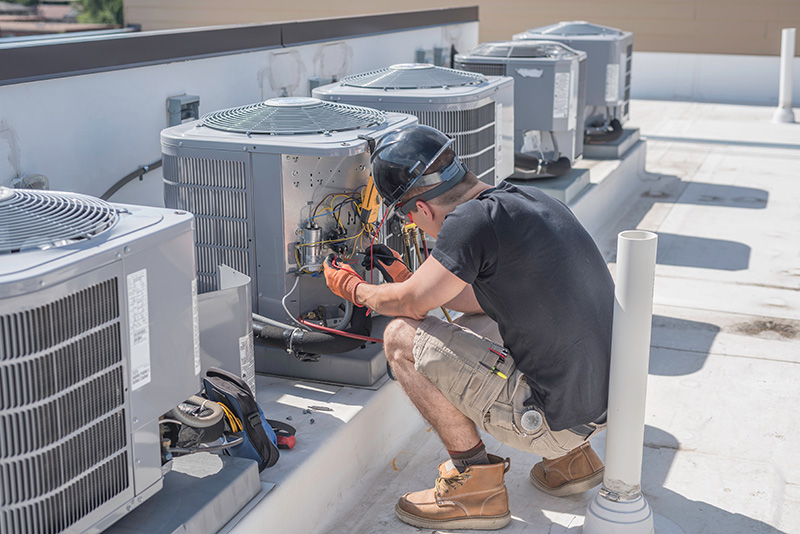Professional Maintenance Services by DMAKS HVAC For Your Needs.
Professional Maintenance Services by DMAKS HVAC For Your Needs.
Blog Article
Energy-Efficient Cooling And Heating Equipments to Save Money On Utility Expenses
As power expenses remain to increase, the value of energy-efficient heating and cooling systems ends up being progressively obvious. These systems not just promise considerable cost savings on utility bills but additionally add to a more lasting future by minimizing power intake. With various alternatives offered, including geothermal heat pumps and ductless mini-splits, homeowner face a multitude of selections that can boost comfort and air quality. However, recognizing the crucial functions and maintenance requirements is vital to making best use of these advantages. What variables should be prioritized when selecting the ideal system for your needs?
Benefits of Energy-Efficient Cooling And Heating Systems
Energy-efficient Cooling and heating systems offer numerous benefits that expand past mere cost financial savings. By taking in much less power, these systems add to decrease greenhouse gas discharges, aiding to combat climate modification and promote sustainability.
Furthermore, energy-efficient HVAC systems usually provide enhanced comfort levels. Most of these systems include innovative technology that allows for better temperature level control and boosted air top quality (DMAKS HVAC). This leads to a much healthier interior environment, which is especially essential for individuals with allergies or respiratory concerns
Furthermore, purchasing energy-efficient cooling and heating systems can enhance residential or commercial property worth. As more consumers prioritize power performance, homes and buildings outfitted with these systems may attract higher proposals in the property market.
Types of Energy-Efficient Heating And Cooling Options
Exactly how can house owners and organizations pick the most suitable energy-efficient HVAC choices for their needs? The market supplies a range of energy-efficient heating and cooling systems, each developed to improve comfort while minimizing power usage.
One option is the variable cooling agent flow (VRF) system, which efficiently regulates the temperature in numerous zones within a building. This system adjusts its refrigerant circulation to match the preferred temperature, resulting in substantial energy savings.
One more prominent option is geothermal heat pumps, which make use of the earth's secure temperature to warmth and great spaces. By moving heat to and from the ground, these systems show impressive effectiveness, especially in modest environments.
Furthermore, ductless mini-split systems give an energy-efficient option for homes doing not have ductwork. These systems permit zone-specific heating and cooling, decreasing power waste in unoccupied locations.
Lastly, high-efficiency heating systems and ac unit, with sophisticated SEER and AFUE ratings, use dependable environment control while eating much less power than typical designs. By examining these options, property owners and services can pick an a/c system customized to their specific demands and energy performance objectives.
Key Functions to Think About

Following, check out the kind of compressor utilized in the system. DMAKS HVAC. Variable-speed compressors can readjust their outcome to match the home heating or cooling demand, causing boosted convenience and energy savings compared to single-speed models. Furthermore, look for systems furnished with clever thermostats that offer programmable setups and remote gain access to, enabling better control over power consumption
One more essential attribute is the system's air purification capability. High-efficiency filters can improve interior air high quality and minimize power intake by making sure the system runs successfully. Consider the type of cooling agent made use of; modern systems frequently employ eco-friendly cooling agents that have a reduced ecological impact.
Lastly, make certain that the system works with zoning innovation, which allows for tailored temperature level control in various areas of your home, boosting convenience while reducing energy use.
Tips for Selecting the Right System

Following, take into consideration power effectiveness ratings, specifically the Seasonal Energy Performance Ratio (SEER) for cooling systems and the Annual Fuel Utilization Efficiency (AFUE) for furnace. Higher ratings show greater efficiency, which can lead to substantial cost savings on utility costs over time.
In addition, examine the kind of HVAC system that ideal fits your way of living and spending plan. Choices include central air, ductless mini-splits, and heat pumps, each with its very own set of advantages and downsides.
Don't forget the significance of appropriate setup and sizing; an incorrectly sized system can cause inefficiencies and raised wear. Consult with an expert Cooling and heating contractor to get professional suggestions customized to your home's distinct demands. This comprehensive strategy will make sure that you pick an energy-efficient HVAC system that satisfies your requirements and budget efficiently.
Upkeep for Optimum Efficiency
Once the right a/c system remains in place, ongoing maintenance ends up being essential to making certain optimal efficiency and durability. A well-kept system runs much more properly, leading to lower energy intake and minimized energy expenses. Routine examinations and tune-ups should be Discover More set up at least twice a year-- once before the cooling season and once prior to the heating season.

Home owners ought to additionally be attentive concerning checking their heating and cooling system's efficiency. Unusual sounds, fluctuating temperatures, or raised power bills can suggest underlying issues that need prompt focus. By attending to these problems quickly, home owners can avoid expensive repair services and expand the life expectancy of their systems.
Buying an upkeep plan with a qualified professional not only improves performance yet also supplies comfort, understanding that the system is running at its ideal. DMAKS HVAC. Regular maintenance is for that reason important for maintaining energy effectiveness and lowering total functional expenses
Conclusion
Finally, energy-efficient heating and cooling systems provide a feasible remedy for reducing utility expenses while improving comfort and air high quality. By integrating advanced technologies and options such as geothermal heat pumps and ductless visit this site right here mini-splits, homeowner can attain substantial power savings and add to ecological sustainability. Mindful factor to consider of dig this system attributes and recurring maintenance further guarantees optimum efficiency, making energy-efficient systems a prudent financial investment for both economic and environmental benefits.
Report this page